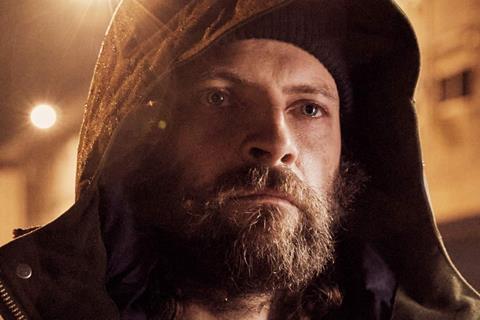UK/Italian Jo Nesbo adaptation from Sky closes out the 79th Venice Film Festival with a thud

Dir: Francesco Carrozzini. Italy/UK. 2022. 93 mins.
Hardened audiences have learned not to expect glittering brilliance from festival closing night films, angled as they often are for undemanding distraction. But it’s a shame that the high-quality Venice 2022 selection should end on such a bathetically glum a note as The Hanging Sun, an Italo-British dollop of Nordic noir that’s not terribly Nordic, despite its origins in a story by Jo Nesbø (on board as an executive producer), and less noir than plain murky. This Sky title will no doubt find an audience as casual platform fodder; more discerning viewers may feel that hanging’s too good for it.
More discerning viewers may feel that hanging’s too good for it
This is the first fiction film by Francesco Carrozzini, known for his 2016 documentary Franca: Chaos And Creation - about his mother, Vogue Italia mainstay Franca Sozzani – and famous also as a music video director for the stellar likes of Beyonce, Jay-Z and Lana del Rey. Given his background, it’s surprising that there’s so little style in this stolid meat-and-potatoes thriller. The setting is a supposedly remote community, apparently on an island far in the North somewhere. One day a mysterious bearded stranger arrives, played by Alessandro Borghi, from this year’s Cannes competitor The Eight Mountains and TV’s Suburra: Blood On Rome. He claims he’s called Ray, but we know he’s really John, and that he’s on the run from his crazed brother Michael (Frederick Schmidt) and their criminal father, known only as Dad (Peter Mullan), who has raised them both as ruthless killers.
Fleeing what he hopes will be his last killing, John arrives at the distant outpost, where a young woman, Lea (Jessica Brown Findlay) is tending to her young son Caleb (Raphael Vicas) and enduring the attentions of her brutish fisherman husband Aaron (Sam Spruell). When Aaron is suddenly declared dead, we discover just as suddenly that he has an identical twin brother, Nicholas (also Spruell), supposedly a kinder, gentler version of Aaron, but in reality just as much of a jerk. Nicholas sets his sights on Lea, which seems altogether fine by her dad Jacob (Charles Dance), the minister who reigns over this fiercely conservative, God-respecting but of course, utterly hypocritical community, dispensing sermons on fear, the Devil and the dreadful outside world.
Meanwhile, John mooches around the place, his heavy beard and omnipresent cap obscuring his face enough to make his emotions utterly imponderable – although when he walks fully clothed into presumably icy water, then lies face down in it, we can assume that he’s not a happy runaway. Still, a cautious Lea and an altogether more enthusiastic Caleb take this gun-packing doomster to their hearts. The soundtrack use of Lee Hazelwood and Nancy Sinatra’s ‘Summer Wine’ makes it clear that John is just the silver-spurred stranger that Lea has been dreaming of, and that this is one of those schematic thrillers that can lazily be categorised as ‘really’ a Western.
The Hanging Sun is a bizarre mess from start to finish, one of those films that seems to come from nowhere, and to be set nowhere in particular. Given the supposed location – Jacob refers to it as “the edge of the world” – it’s bizarre that the locals speak with English accents, some of them downright cut-glass, as in the case of Caleb, whose eccentrically posh style of speech (“How do you intend to nourish and hydrate yourself?”) is the boy’s way of dealing with a speech impediment. In reality, it makes him sound like a junior Jacob Rees-Mogg, and while young Raphael Vicas is plucky enough in the role, he’s simply the wrong choice to be believable in this part and environment; alas, Carrozzini has as bad an ear for English accents as he does for dialogue.
A sound supporting cast heave their characters on their backs like cardboard crucifixes. Dance is acceptably silky-nasty in a lugubrious Max von Sydow sort of role, and Mullan must surely – after excelling in Ozark and The Top Of The Lake – be hankering to give his feral patriarch routine an extended holiday. In a story that’s quite explicitly about resisting oppressive father figures, it’s a shame that Jessica Brown Findlay is palmed off with a role that’s largely restricted to being dourly long-suffering. As for Borghi, he has some presence as a steely-eyed sulkpot, but there’s no getting past the oddness of his accent, explained by the fact that Mullan adopted John as the orphaned child of ‘immigrants’ (and where the hell were social services when that happened?).
DoP Nicolaj Bruel has previously distinguished himself in collaborations with Matteo Garrone (the aquarium-toned Dogman and the wildly extravagant Pinocchio), but he doesn’t bring much colour to this drab affair, which – in interiors and Norwegian-shot exteriors alike – isn’t so much atmospheric as just plain overcast.
Production companies: Cattleya, Groenlandia, Sky Studios
International sales: NBCUniversal Global Distribution, sam.adams@nbcuni.com
Producers: Riccardo Tozzi, Matteo Rovere, Giovanni Stabilini, Marco Chimenz. Francesca Longardi
Screenplay: Stefano Bises
Based on Midnight Sun by Jo Nesbø
Cinematography: Nicolaj Bruel
Production design: Mikael Varhelyi
Editing: Giuseppe Trepiccione
Music: Andrea Farri
Main cast: Alessandro Borghi, Jessica Brown Findlay, Peter Mullan, Charles Dance
























